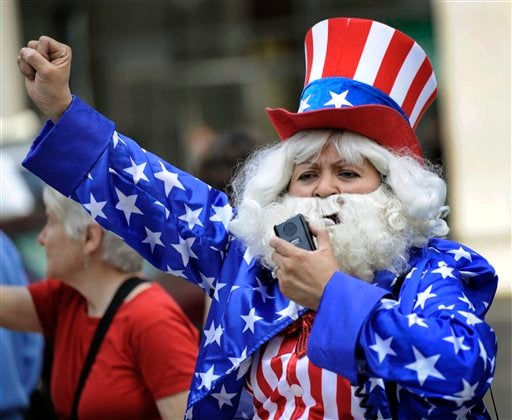|
September 26, 2014
Shift away from political moderation contributes to rising inequality, threats to democracy, Stanford experts say
Stanford sociologists Doug McAdam and Karina Kloos write in a new book that the ongoing influence of racially inflected social movements and politics since the 1960s has led to unprecedented levels of inequality and partisanship. They argue these trends threaten American democracy, and suggest a pathway to political moderation. By Clifton B. Parker

Political partisanship is threatening democracy, sociologists Doug McAdam and Karina Kloos argue in their new book, 'Deeply Divided.' (Photo: Paul Beaty/AP Photo)
Political division and economic inequality are eroding America's democratic ideals and practices, according to two Stanford scholars.
"The country is now more starkly divided in political terms than at any time since the end of Reconstruction and more unequal in material terms than roughly a century ago, greater, even, than on the eve of the Great Depression," said Doug McAdam, a Stanford sociology professor.
McAdam is the co-author of a new book, Deeply Divided: Racial Politics and Social Movements in Post-War America, along with Stanford sociology graduate student Karina Kloos.
In their analysis of modern U.S. political history, McAdam and Kloos contrast the contemporary era with American politics during World War II and the postwar period, which was "drastically different than today's partisan bloodletting," as they describe it.
Ideological extremes
The researchers said the return in the 1960s of social movements as political forces in American politics have pushed the parties to their more ideological extremes, marginalizing the median voter and the moderate politics that characterized the earlier period.
In particular, the civil rights movement and the powerful white backlash that developed in response transformed the racial geography of American politics and laid the foundation for the contemporary Democratic and Republican parties, McAdam and Kloos wrote.
"By revitalizing and legitimating the social movement form, the civil rights movement of the early 1960s reintroduced centrifugal pressures to American politics," McAdam said.
He said the Tea Party is the most recent example of this dynamic, which pushes GOP candidates to play to the more mobilized and generally more ideologically extreme base, instead of the moderate Eisenhower-Republican voter.
Inequality in politics, economics, race
The growing chasm between political elites and the general public, the authors argue, has led to a fundamental disconnect between government policies and the views of the general public.
With social mobility on the decline, Kloos said, we are becoming a country of "haves" and "have-nots."
"You only have to look at the numbers after the Great Recession," said Kloos. "The richest Americans came out well ahead while the rest of the country still struggles to recover."
McAdam added, "The wealthy are simply in a much better position to bend the will of the system to their views."
For example, in removing virtually all restrictions on political giving, the Citizens United v. Federal Election Commission case has made it easier for the wealthy to dominate the political system, he said.
The combination of increasing economic inequality, the growing influence of money in politics and concerted efforts to restrict rather than uphold voting rights pose real threats to the ideals and practices of American democracy, they wrote.
They also point out that the "post-racial society" that many hoped would emerge after President Barack Obama's election has failed to materialize.
"The harsh reality is that for all its historic differences, Obama's presidency has done little to reduce the country's underlying racial, political and economic divisions," said McAdam, noting that racialized politics are almost as evident today as they were in the tumultuous 1960s-70s civil rights era.
Rebuilding the middle
How can the country rebuild a viable political middle?
McAdam suggested establishing a third party that appeals to the large number of moderate, centrist Americans who believe that neither the Democrats nor Republicans now adequately represent their interests. Some politicians, like former New York City mayor Michael Bloomberg, have explored this idea.
"Another approach would be to aggressively push for certain institutional reforms that would have the effect of restraining extreme partisanship, better representing the American people and upholding political equality," he said.
McAdam suggested that these reforms might include stripping partisan legislatures of the power to redraw the boundaries of congressional districts. The redistricting process could then be turned over to bipartisan election commissions, as several states have already done. Institutional efforts to uphold, rather than restrict, voter rights are also essential.
Other recommendations, he said, include publicly financed campaigns, legal challenges to the U.S. Supreme Court's decision in the Citizens United case and an overhaul of the Electoral College method of allocating votes in the presidential election.
Power to the people
Kloos urges people to get out and vote.
"At present, the low rates of participation in primary campaigns favor the mobilized, movement wings of the two parties, which in turn grants more leverage and influence to the ideological extremes in American society," Kloos and McAdam wrote.
Kloos said in an interview, "My generation is, understandably, jaded and apathetic toward government, but now more than ever we have to participate in the political process and vote – in the presidential elections, the mid-term elections and especially the primaries."
Kloos and McAdam, the Ray Lyman Wilbur Professor at Stanford, agree that it is incumbent on those who are dissatisfied with the current dysfunction to revitalize American democracy by rebuilding a more civil, centrist political consensus.
For more Stanford experts in sociology and other topics, visit Stanford Experts.
-30-
|